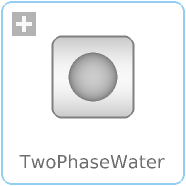WOLFRAM SYSTEM MODELER
TwoPhaseWaterExtension of the StandardWater package |
|
Package Contents
|
Make StandardWater.BaseProperties non replaceable in order that inheritance is possible in model ExtendedProperties |
|
|
Plenty of two-phase properties |
|
|
Test the TwoPhaseWater model |
Package Constants (27)
| ThermoStates |
Value: Modelica.Media.Interfaces.Choices.IndependentVariables.ph Type: IndependentVariables Description: Enumeration type for independent variables |
|---|---|
| mediumName |
Value: "WaterIF97" Type: String Description: Name of the medium |
| substanceNames |
Value: {"water"} Type: String[:] Description: Names of the mixture substances. Set substanceNames={mediumName} if only one substance. |
| extraPropertiesNames |
Value: fill("", 0) Type: String[:] Description: Names of the additional (extra) transported properties. Set extraPropertiesNames=fill("",0) if unused |
| singleState |
Value: false Type: Boolean Description: = true, if u and d are not a function of pressure |
| reducedX |
Value: true Type: Boolean Description: = true if medium contains the equation sum(X) = 1.0; set reducedX=true if only one substance (see docu for details) |
| fixedX |
Value: true Type: Boolean Description: = true if medium contains the equation X = reference_X |
| reference_p |
Value: 101325 Type: AbsolutePressure (Pa) Description: Reference pressure of Medium: default 1 atmosphere |
| reference_T |
Value: 298.15 Type: Temperature (K) Description: Reference temperature of Medium: default 25 deg Celsius |
| reference_X |
Value: fill(1 / nX, nX) Type: MassFraction[nX] (kg/kg) Description: Default mass fractions of medium |
| p_default |
Value: 101325 Type: AbsolutePressure (Pa) Description: Default value for pressure of medium (for initialization) |
| T_default |
Value: Modelica.Units.Conversions.from_degC(20) Type: Temperature (K) Description: Default value for temperature of medium (for initialization) |
| h_default |
Value: specificEnthalpy_pTX(p_default, T_default, X_default) Type: SpecificEnthalpy (J/kg) Description: Default value for specific enthalpy of medium (for initialization) |
| X_default |
Value: reference_X Type: MassFraction[nX] (kg/kg) Description: Default value for mass fractions of medium (for initialization) |
| C_default |
Value: fill(0, nC) Type: ExtraProperty[nC] Description: Default value for trace substances of medium (for initialization) |
| nS |
Value: size(substanceNames, 1) Type: Integer Description: Number of substances |
| nX |
Value: nS Type: Integer Description: Number of mass fractions |
| nXi |
Value: if fixedX then 0 else if reducedX then nS - 1 else nS Type: Integer Description: Number of structurally independent mass fractions (see docu for details) |
| nC |
Value: size(extraPropertiesNames, 1) Type: Integer Description: Number of extra (outside of standard mass-balance) transported properties |
| C_nominal |
Value: 1.0e-6 * ones(nC) Type: Real[nC] Description: Default for the nominal values for the extra properties |
| smoothModel |
Value: false Type: Boolean Description: True if the (derived) model should not generate state events |
| onePhase |
Value: false Type: Boolean Description: True if the (derived) model should never be called with two-phase inputs |
| fluidConstants |
Value: waterConstants Type: FluidConstants[nS] Description: Constant data for the fluid |
| Region |
Value: 0 Type: Integer Description: Region of IF97, if known, zero otherwise |
| ph_explicit |
Value: true Type: Boolean Description: True if explicit in pressure and specific enthalpy |
| dT_explicit |
Value: false Type: Boolean Description: True if explicit in density and temperature |
| pT_explicit |
Value: false Type: Boolean Description: True if explicit in pressure and temperature |
Information
This information is part of the Modelica Standard Library maintained by the Modelica Association.
Example: TwoPhaseWater
The TwoPhaseWater package demonstrates how to extend the parsimonious BaseProperties with a minimal set of properties from the standard water package with most properties that are needed in two-phase situations. The model also demonstrates how to compute additional properties for the medium model. In this scenario, that builds a new medium model with many more properties than the default, the standard BaseProperties is used as a basis. For additional properties, a user has to:- Declare a new variable of the wanted type, e.g., "DynamicViscosity eta".
- Compute that variable by calling the function form the package, e.g., eta = dynamicViscosity(state). Note that the instance of ThermodynamicState is used as an input to the function. This instance "state" is declared in PartialMedium and thus available in every medium model. A user does not have to know what actual variables are required to compute the dynamic viscosity, because the state instance is guaranteed to contain what is needed.
- Attention: Many properties are not well defined in the two phase region and the functions might return undesired values if called there. It is the user's responsibility to take care of such situations. The example uses one of several possible models to compute an averaged viscosity for two-phase flows.
- Declare an instance of ThermodynamicState, e.g., "ThermodynamicState dew".
- Compute the state, using an instance of SaturationProperties, e.g., dew = setDewState(sat)
- Compute properties on the phase boundary to your full desire,
e.g., "cp_d = specificHeatCapacityCp(dew)".
The sample model TestTwoPhaseStates test the extended properties
The same procedure can be used to compute properties at other state points, e.g., when an isentropic reference state is computed.
Wolfram Language
SystemModel["Modelica.Media.Examples.TwoPhaseWater"]

